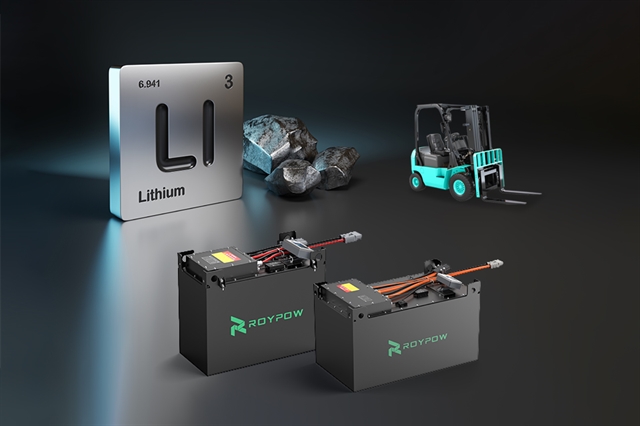
Switching forklifts from lead-acid to lithium seems like a no-brainer. Lower maintenance, better uptime – great, right? Some operations report saving thousands yearly just on upkeep after making the change. But dropping a lithium battery into a machine designed for lead-acid can bring unexpected headaches. Serious ones.
Are you overlooking critical safety and cost factors? This piece breaks down the main risks before they hit your bottom line. We'll look at:
- Electrical mismatches that fry components.
- Physical dangers from improper battery fits.
- The hidden costs that drain your budget long-term.
- How to assess if conversion truly makes sense for your equipment.
At ROYPOW, we deal with these conversion challenges daily. Our purpose-built LiFePO4 forklift batteries address these risks directly. We focus on providing reliable power solutions engineered for safe, seamless integration.
Why Consider Converting to Lithium Batteries?
The shift towards lithium power in forklifts isn't slowing down. Global market growth is projected above 25% year-over-year for 2025. Operators are actively seeking upgrades from older lead-acid technology for solid reasons.
Ditching High Maintenance Costs
Lead-acid batteries demand constant attention. You know the drill:
- Regular watering checks.
- Cleaning terminals to fight corrosion.
- Dealing with a much shorter operational lifespan.
This upkeep eats into your resources. One logistics center, for example, reclaimed $15,000 annually just by getting rid of these tasks. Solutions such as ROYPOW's LiFePO4 batteries eliminate this entirely – zero daily maintenance needed.
Boosting Operational Efficiency
Productivity often takes a hit with lead-acid:
- Long recharge times disrupt workflow.
- Battery swapping consumes valuable labor hours.
- Voltage drops mean sluggish performance later in shifts.
Lithium flips the script. You get faster charging, steady power delivery all shift long, and the ability to run 24/7 operations without battery changes. That means more uptime and smoother workflows.
The Safety Question Mark
So, the benefits look great. But what about just swapping the battery in your existing lead-acid forklifts? Is that direct modification actually safe?
Here’s the blunt truth: maybe not. Making the switch without understanding the potential pitfalls can lead to serious problems, turning a planned upgrade into a costly mistake.
Risk 1: Electrical System Mismatches
Let's get technical for a moment, because electrical compatibility is a big deal. You can't just swap battery chemistries and expect a perfect handshake between the new battery and your forklift's existing brain. These systems often speak different electrical languages, and forcing them together causes problems.
The Danger of Voltage Conflicts
Do you think voltage is just voltage? Not quite. Even if a lead-acid and a lithium battery share the same nominal rating (like 48V), their actual operating ranges and discharge curves differ. Lithium packs maintain voltage differently.
Sending voltage signals that the forklift's controller isn't expecting can overload circuits. The result? You could easily end up with a fried controller. That's a recipe for significant downtime and a repair bill that often runs into thousands of dollars. Definitely not the savings you were hoping for.
Charging Communication Breakdowns
Old lead-acid batteries often lack communication capability, leading to several issues:
- Inefficient or incomplete battery charging.
- Failure to relay critical error codes from the BMS.
- Potential safety shutdowns or reduced battery lifespan.
- Missing out on valuable diagnostic data.
By contrast, modern lithium batteries, particularly advanced LiFePO4 types with an integrated Battery Management System (BMS), are smart. They use communication protocols (like CAN bus) to 'talk' with the charger and the forklift itself. This ensures optimal charging, cell balancing, and safety monitoring.
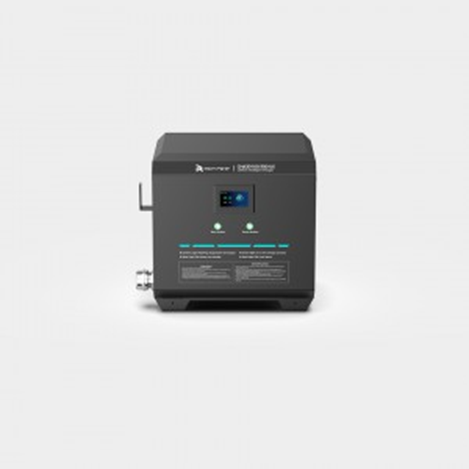
Bridging the Compatibility Gap
To make these different electrical systems work together more safely and effectively, you need a bridge. ROYPOW provides smart, safe, and efficient chargers that do more than just recharge — they actively manage and protect. These chargers automatically adjust the charging current based on the battery’s real-time condition, ensuring smooth interaction and optimal performance. Built-in protection features guard against overcharging, overcurrent, and over-discharging, keeping the battery within safe operating parameters at all times. This not only prolongs battery life but also protects the forklift’s electrical components from damage, offering a double layer of safety for both the battery and the vehicle it powers.
Risk 2: Structural Safety Hazards
Beyond the wiring, the physical fit and security of the new battery are paramount. Lithium batteries often have different dimensions and weight distribution compared to their lead-acid counterparts. Simply dropping one into the old space without considering the structural implications is asking for trouble.
When Fit Becomes a Failure
This isn't just theory. A company in Germany learned this the hard way, experiencing a dangerous short circuit after converting a forklift. The cause wasn't a faulty battery; it was traced back to an unreinforced battery compartment. The lithium battery shifted during routine operations, got damaged, and caused a short circuit. This was entirely preventable.
Why Compartments Need Attention
Forklifts are built to accommodate the specific size, weight, and anchoring points of hefty lead-acid batteries. Lithium packs differ:
- They might be lighter or shaped differently, leaving gaps.
- Existing mounting points may not align correctly or offer adequate support.
- Operational vibrations and impacts can easily dislodge an improperly secured battery.
Ensuring mechanical safety, as outlined in standards like ISO 12100 (which covers safe machinery design), demands that all components, including the battery, are mounted securely. A loose battery is a direct structural hazard.
Designed to Fit: BCI & DIN Compliant
To ensure a secure and seamless replacement for lead-acid batteries, ROYPOW offers a series of lithium forklift battery models that comply with both US BCI and EU DIN standards.
The BCI (Battery Council International) standard defines battery group sizes, terminal types, and dimensions commonly used in North America, while the DIN (Deutsches Institut für Normung) standard specifies battery dimensions and configurations widely adopted across Europe.
By adhering to these globally recognized standards, ROYPOW batteries offer direct drop-in compatibility for a broad range of forklift models, eliminating the need for tray modifications and significantly reducing installation time and cost.
Risk 3: The Hidden Cost Black Hole
Saving money is a big driver for conversion, but are you looking at the full financial picture? The initial price tag for modifying an old forklift seems appealing. Yet, when you consider costs over the machine's remaining operational life – often called Total Cost of Ownership (TCO) – the comparison with a new, purpose-built lithium forklift becomes more complex.
Conversion vs. New Lithium: Cost Snapshot
Here’s a simplified look at potential costs over a 3-year window in a representative scenario:
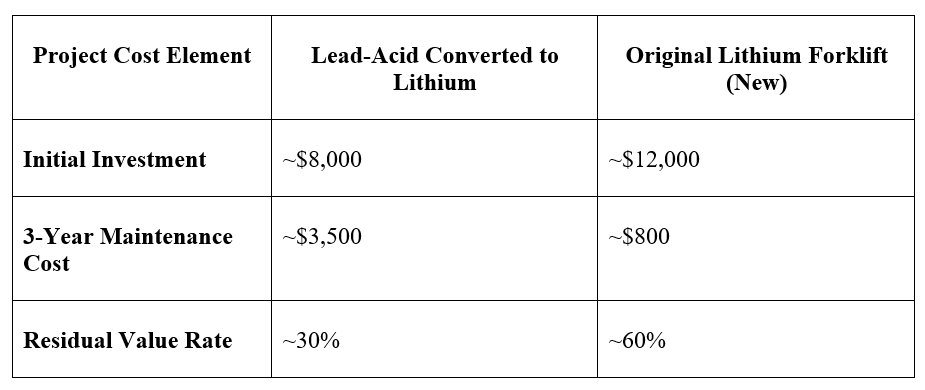
Note: These figures are illustrative and can vary significantly based on specific forklift models, battery choices, usage intensity, and local market conditions.
When Does Conversion Make Financial Sense?
At first glance, the $8,000 initial cost for conversion looks like a clear win compared to $12,000 for a new machine. That's the immediate attraction.
However, dig a bit deeper. The estimated maintenance over just three years is considerably higher for the converted unit in this example. More critically, the residual value – what your asset is worth later – plummets. You get far less back when you eventually replace or sell the converted forklift (30% value retention vs 60% for the new lithium model).
This comparison points towards a practical guideline: Conversion tends to be most financially viable for older forklifts that are already nearing retirement (say, within the next 3 years or so). For these machines, minimizing the upfront cost makes sense because you won't be holding onto them long enough for the low residual value to sting badly. If you need a machine for the longer haul, investing in a new, integrated lithium forklift often presents better overall economic value.
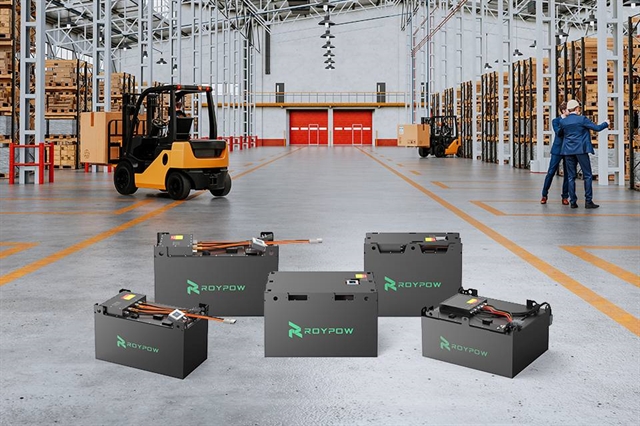
Action Guide: Is Conversion Suitable?
Feeling overwhelmed by the potential risks? Don't be. Evaluating whether a lithium conversion makes sense for your specific forklift involves looking at key factors. This quick checklist provides a starting point for that assessment.
Consider these points for the forklift you might convert:
- How old is the unit? Was it manufactured after 2015?
- Newer models may offer better baseline compatibility, but weigh this against the Total Cost of Ownership insights from Risk 3, especially regarding residual value if you plan long-term use.
- Does its current electrical system support CAN bus communication?
- As covered in Risk 1, this is often needed for seamless integration with the smart features of modern lithium battery management systems.
- Is there adequate physical space for potential battery compartment adjustments or required reinforcement?
- Remember Risk 2 – ensuring a secure, structurally sound fit is non-negotiable for operational safety.
Thinking through these questions gives you a preliminary idea of feasibility. If conversion still seems like a viable option, your next step is vital: consult with professionals. Talk through your specific forklift model, its condition, and your operational demands with experienced conversion technicians or a reputable battery supplier like ROYPOW. We can provide a detailed evaluation for a safe and successful upgrade.
Ready to Make Forklift Conversions Safer With ROYPOW?
Converting older forklifts to lithium power offers benefits, but hidden electrical, structural, and cost risks can trip you up. Being aware of these potential pitfalls is the first step toward making a smart, safe decision for your fleet.
Keep these key takeaways handy:
- Electrical systems must be compatible regarding voltage and communication protocols.
- Structural modifications (like reinforcement) are often needed for a secure, safe fit.
- Analyze the Total Cost of Ownership, considering maintenance and residual value.
- Conversion typically makes the most financial sense for older units nearing retirement.
- Using matched, compatible components like smart adapters and chargers is vital.
ROYPOW engineers LiFePO4 batteries and complete compatible systems, including smart adapters and high-efficiency chargers, specifically to address these conversion challenges. We focus on providing integrated solutions aimed at making your forklift power upgrade both safer and more reliable from start to finish.
Ready to explore safe conversion options for your specific fleet? Take the next step:
⇒ Make an appointment for a free conversion assessment.
⇒ Download the Lead-acid Conversion Compliance Manual.
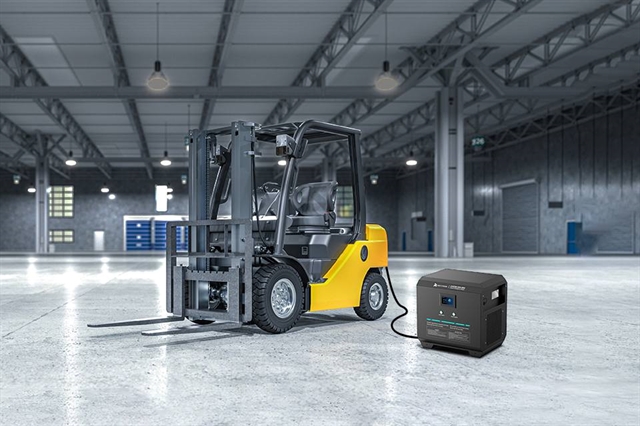
Forklift Lithium Conversion FAQs
Is it safe to replace lead-acid battery with lithium ion?
Yes, it can be safe, but only if done correctly. Simply swapping batteries without modifications invites risks. A safe conversion addresses electrical compatibility using proper components (like smart adapters and matched chargers from providers such as ROYPOW) and structural fit (reinforcement). Professional assessment and installation are recommended.
What are the risks associated with lithium batteries?
General lithium-ion chemistries carry risks like overheating or fire if they are damaged, misused, or poorly made. However, the LiFePO4 (Lithium Iron Phosphate) chemistry used in ROYPOW forklift batteries is known for its superior thermal stability and safety compared to other types.
Advanced Battery Management Systems (BMS) provide additional layers of protection against overcharging, overheating, and short circuits. The main risks in conversion relate to improper electrical or structural integration.
What happens if I use lithium batteries instead of alkaline?
This typically refers to consumer batteries (AA, AAA, etc.), not industrial ones. Lithium primary cells often have a higher voltage than alkaline cells (around 1.8V vs. 1.5V for AAs).
Using them in devices designed strictly for alkaline voltage can damage the device's electronics. Always stick to the manufacturer's recommended battery type for consumer gadgets. This isn't applicable to engineered forklift battery systems.
For further information and inquiry, please visit www.roypow.com or contact us.